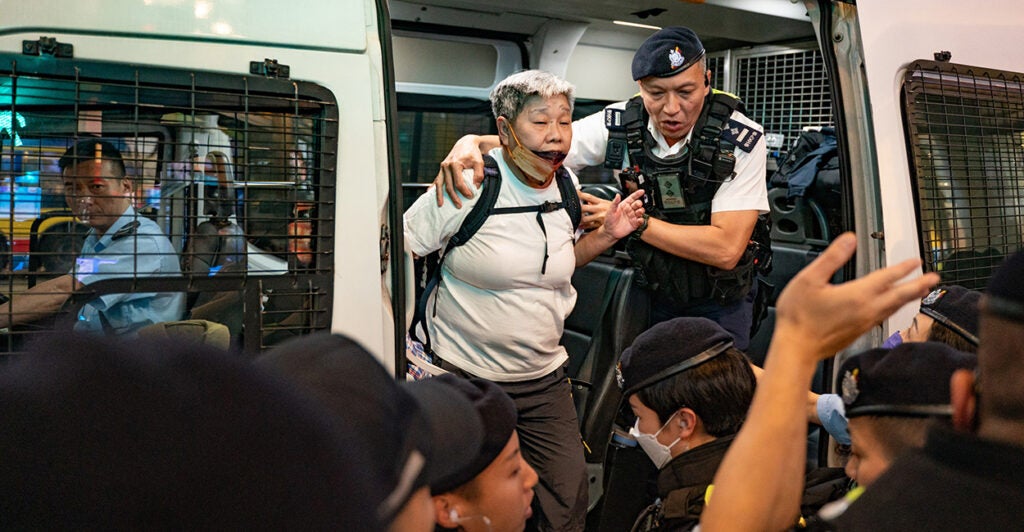In recent days, Chinese internet users have found themselves unable to edit their social media profiles. The seemingly inexplicable phenomenon happens every year in China in the days leading up to June 4, to the consternation of the young and uninitiated.
“They’re so strict during the university entrance exam period,” wrote one Chinese user, referring to a nationwide standardized test scheduled for June 7 and 8 that largely will determine whether and where high school seniors continue their academic pursuits.
Similar comments blaming the inability to edit profiles on security measures related to the exam have been seen across the social media landscape. That these individuals can’t think of any other reason for heightened sensitivity this time of year exposes the naïve innocence of a population cohort still ignorant of the horrors that the government inflicted on its own people on June 4, 1989—the real reason for the social media disruptions.
Today is the 35th anniversary of the Tiananmen Square massacre. Each year at this time, the communist regime closes some buildings and public services around the famed public square in Beijing.
Virtual private networks, or VPNs, used by many educated Chinese to circumvent the country’s “Great Firewall,” mysteriously stop working. Across China, high-profile dissidents are rounded up and detained. Previous years saw reports of dissidents being forced to take all-expense-paid vacations under the watchful eye of government handlers.
The Chinese government goes to a lot of effort to make people forget June 4. Perhaps too much effort—ironically, its bizarre behavior during this period is itself a form of commemoration and makes it hard for the rest of us to forget.
When I lived in Beijing, I always knew the Tiananmen anniversary was near when I started seeing increased police presence near university campuses and officers near the city center armed with assault rifles instead of the standard-issue batons police usually carry.
Clearly Beijing is petrified of June 4, and with good reason. The massacre is perhaps the blackest mark on the Chinese Communist Party’s record, even more unforgivable than the Great Leap Forward that caused the greatest man-made famine in recorded history and the Cultural Revolution that pushed the entire country into a decade of chaos. Those resulted from policy failures and intraparty power struggles.
But this was the People’s Liberation Army opening fire on unarmed civilians—many of them students with promising futures. The Chinese people were shocked that their government would kill its own citizens in cold blood. So divisive was the Chinese Communist Party’s decision to use force that its own general secretary opposed the move and subsequently was purged and kept under house arrest for the remainder of his life.
If any incident ever threatened to destroy the CCP and end its regime, this was it.
The widespread calls through the years for Beijing to acknowledge the truth and compensate victims’ families consistently have fallen on deaf ears. Beijing doesn’t dare admit the truth, for fear it would irreparably damage the CCP’s legitimacy.
Instead, Beijing has spent 35 years attempting to wipe the Chinese people’s brains of any memory of what happened on that horrific night. On the surface, this has been successful. If there’s one topic people don’t discuss in China, it’s Tiananmen.
But the fact they don’t talk about it doesn’t mean they don’t remember. Although many in the rising generation know little or nothing of what happened June 4, 1989, their parents know. Some of them eventually break the news to their children when they’re old enough to bear the shock—and to be trusted not to speak about it.
For the most part, this is a dangerous topic, though, and ignorance is often deemed preferable to the truth.
Beijing can alter and whitewash history, but it can’t change the truth about what happened 35 years ago. Nor should we stand idly by as it tries to do so.
The Chinese people still long for freedom. This was apparent with the nationwide white paper protests a year and a half ago, as well as with the lone protester on Beijing’s Sitong Bridge ahead of Chinese leader Xi Jinping’s appointment in 2022 to a precedent-breaking third term in power, an incident reminiscent of the iconic photo of a lone man confronting a line of Chinese tanks following the Tiananmen massacre.
This longing for freedom also is evidenced by the exponential increase in migration out of China since COVID-19 restrictions were lifted in late 2022.
We can’t bring freedom to China against the will of its government, but we can help preserve the memory of the Tiananmen martyrs and what they stood for. For decades, Hong Kong carried this torch through a vigil that drew tens of thousands of participants each year. Sadly, that city’s residents no longer can play this role, due to two draconian “national security” laws that made such activities illegal.
The U.S. and Europe should help fill the vacuum by holding more vigils, establish June 4-themed museums, and educate the public about what really happened 35 years ago in Beijing.
We also can help the cause by empowering Chinese diaspora communities to carry on their march toward freedom. The Chinese Communist Party fears its overseas citizens and uses many means to prevent them from exercising their freedom of speech and other political liberties. We must not let it do that in defiance of our laws and sovereignty.
The courage of some Chinese students in recent years to speak out publicly against their government on U.S. campuses—and some students’ attempts to establish student organizations outside the reach of Beijing’s oversight—show that the spirit of freedom that played out on Tiananmen Square 35 years ago remains bright in the hearts of many Chinese.
By embracing and cultivating this spirit, we not only enable them to enjoy their guaranteed freedoms, but also contribute to their longer-term efforts to drive greater freedom in China.
